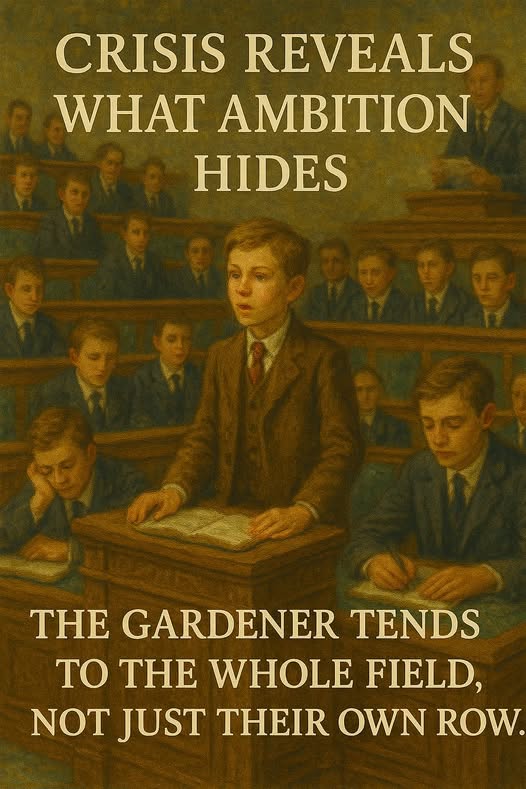
The mock parliament chamber was unusually quiet at first—just the rustle of papers and the shuffling of chairs. Yesterday’s session had been all whispers and shadows, where alliances were forged in corners, and words were honed like blades. Emil had left that room with a knot in his chest, knowing that cleverness without conscience could outmaneuver integrity if left unchecked.
Today, the teacher stepped to the front with a folded sheet of paper and a faint, almost theatrical smile.
“A crisis has struck the Republic,” she declared. “A sudden flood has devastated the southern provinces. The grain stores are gone, the roads are washed out, and thousands are displaced. You, members of Parliament, must respond.”
A low murmur rippled through the room. In seconds, the order of yesterday dissolved. Some MPs began drafting statements of outrage. Others hurled accusations across the aisle: “Your ministry failed to maintain the dams!” “You cut the emergency budget!” The mock journalists scribbled furiously, sensing a scandal worth exaggerating.
Emil felt the pull—he could sharpen the chaos into a weapon, discredit rivals, and rally his own “party” behind him. He could win.
But a line from his grandfather returned to him, almost like a voice at his shoulder:
“Power is not a throne. It’s a flame. It can light the way—or burn everything down.”
He rose and asked for the floor—not with the booming cadence of a conqueror, but with the measured tone of a caretaker.
“We are not parties facing each other,” he began, “we are citizens facing a storm. The flood does not ask who we voted for. It only asks whether we will stand together or watch the waters take more.”
Instead of dictating, Emil convened an open council, inviting both allies and rivals to speak. He gave the fictional “Minister of Agriculture” the authority to coordinate food aid, even though she had opposed him in yesterday’s debates. He scrapped a popular infrastructure project his “party” had championed, redirecting funds to rebuild the southern roads.
Every choice was a risk. Every concession might weaken his standing in the next mock election. But Emil found that when he treated the parliament like a garden—where every voice was a seed—the noise softened, and something steady began to grow.
By the session’s end, the mock republic had a plan: relief convoys, emergency shelters, and a public address to calm the “nation.”
As Emil gathered his notes, the teacher caught his eye. There was no applause, no dramatic victory. But in the quiet, Emil recognized something stronger—trust.
As he left the chamber, he noticed his grandfather standing in the hallway, leaning on his cane. No words were exchanged—just a small nod, the kind a gardener gives when he sees a sapling bending, but not breaking, in the wind.
Outside, clouds gathered against the classroom windows. Somewhere inside him, Emil understood: this storm had only been a rehearsal. The real tempests were still to come.

